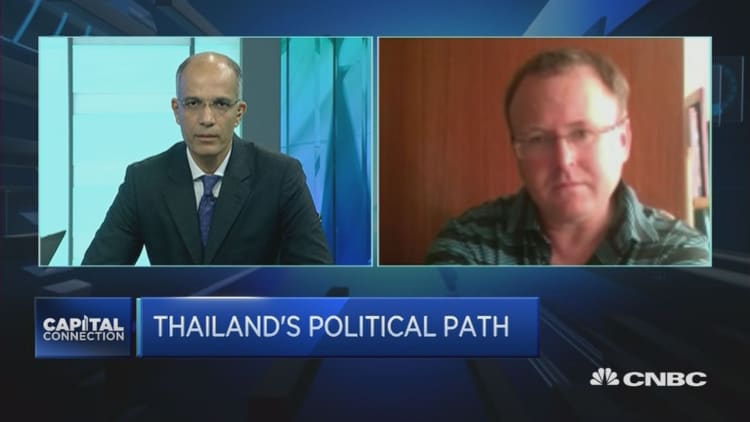One year after Bangkok's Erawan shrine bombing, Thailand is set to begin surveillance on foreigners in an effort to bolster national security, but it's unclear just how effective the program will be.
Starting in 2017, foreign visitors to the country known as the Land of Smiles will be required to use custom SIM cards with location-tracking features, media widely reported this week. The plan was approved in principle by the country's telecoms regulator, the National Broadcasting and Telecommunications Commission (NBTC), who said the SIM cards were aimed at helping officials crack down on crime.
Foreigners with expired visas have long been a problem for Thailand, a country whose renowned hospitality, cuisine and cheap standard of living makes it a haven for backpackers. In March, police took fresh steps to combat the issue, banning those who unlawfully overstay from re-entering the country, and the NBTC's proposal was seen as an extension of those efforts.
Following a number of high-profile crimes in which foreigners were found to be the key suspects, the new measure was also interpreted as a means to fight more deadly offenses.
Two Uighur men from China's Xinjiang province are set to go on trial next year for the 2015 Erawan shrine bombing, and two Burmese migrant workers were sentenced to death for two grisly murders on the island of Koh Tao in 2014. In April, Thai intelligence officials warned of planned attacks by Uighur and Chechen militants. Meanwhile, Thursday and Friday saw a series of explosions hit three of the country's most popular tourist resorts, but it was not clear who the perpetrators were.
However, location-tracking SIM cards may not be much help as an anti-crime tool.
"I very much doubt anyone in the security architecture expects this to be a silver bullet solution to concerns about national and public security," Christian Lewis, Asia associate at Eurasia Group, told CNBC. "A southern insurgency, porous borders, complacent street-level police, and corruption would be much more impactful problems to solve if public security were indeed the chief priority."
Indeed, the country's largest terror threat stems from Muslim Malay separatists in southern Thailand, all of whom are Thai citizens, pointed out Justin Hastings, a senior lecturer and terror specialist at the University of Sydney.
The country already has strict rules for foreigners traveling, staying or permanently living in Thailand, so the new plan may not add much more value, Lewis added. "Operators of lodgings are legally required to declare their overseas guests. Foreigners with long-term visas must declare their address every 90 days, and owners of their residences are required to report the alien presence-even if the homeowner is reporting on their spouse," he noted.

Moreover, it's not clear how the new SIM cards would differ from existing ones that already allow authorities to pinpoint a user's whereabouts.
"Following the Erawan shrine bombing, Thai authorities required SIM card registration with location tracking capability, to combat terrorism and other crimes, such as organized crime and drug dealing," said Rajiv Biswas, Asia-Pacific chief economist at IHS Markit.
‘Biting the hands that feeds you’
The new policy is not expected to drastically impact Thailand's booming tourism industry, which accounts for around 10 percent of gross domestic product, according to Reuters. And even if visitor arrivals do drop in the short-term, the government is widely expected to respond in favor of tourists.
International travelers are increasingly aware of the global terror threat and the need for governments to strengthen their response, so foreign response to the new SIM cards may be subdued, said Biswas.
"Anything that impedes on the ability of foreigners to move around the country freely, particularly given the parlous general political situation in Thailand, is not likely to encourage foreign direct investment or tourism. But my guess is that the government would have to begin harassing foreigners in a major way for there to be a noticeable effect, which has not happened yet," said Hastings.
It's unclear whether the new SIM cards would be provided free of charge or whether tourists would have to pay for them—a factor that could impact arrival statistics.
"If the costs are born directly by tourists, it would have downside implications primarily on lower-income regional tourists, who are part of a fast-growing demographic with significant upside," Lewis explained.
But from a privacy point of view, the increased surveillance definitely raised alarm bells. At a press briefing this week, the NBTC clarified that mobile phone operators would only begin surveillance when approached by authorities for criminal purposes but that may not help sentiment.
"People around the world are increasingly becoming cyber-privacy conscious. Digital privacy is moving toward becoming more of a recognized human right. An 'electronic tracking' holiday just doesn't really fit well with that," warned Suelette Dreyfus, lecturer at the University of Melbourne.

